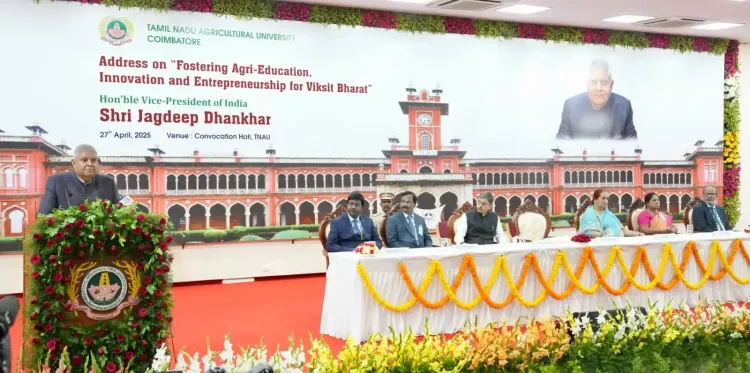Is 6,000 Agri-Startups Enough for India?

Synopsis
Key Takeaways
- Urgent need to increase agri-startups in India.
- Government budget of Rs 1 lakh crore for FPO.
- Transition from food security to farmer prosperity is essential.
- Farmers must engage in effective marketing.
- Importance of connecting research with practical agriculture.
New Delhi, April 27 (NationPress) On Sunday, Vice President of India Jagdeep Dhankhar urged entrepreneurs to fully leverage the government’s incentives to increase the current count of agri-startups, which stands at just 6,000 in a nation of 1.4 billion.
While addressing an audience at Tamil Nadu Agricultural University in Coimbatore, centered on the theme ‘Fostering Agri-Education, Innovation and Entrepreneurship for Viksit Bharat’, Dhankhar remarked, “With 6,000 agri-startups, we are far from the ideal number for a country with 100 million farming communities and vast farmlands.”
“The government has introduced numerous initiatives. It’s crucial for people to be aware of these. For instance, the Farmer Producer Organisation (FPO) has a budgetary allocation of Rs 1 lakh crore to support various activities aimed at enhancing farmer infrastructure,” he elaborated.
The Vice President emphasized the need to transition from food security to farmer prosperity, stating that the evolution should begin at institutions like Tamil Nadu Agricultural University.
He further insisted that farmers should not only focus on production but also engage in marketing their produce effectively.
“Farmers should not merely be producers. They need to time their sales wisely in accordance with market conditions, as ignoring this can result in financial losses,” he observed.
He advocated for empowering farmers through awareness and emphasized the robustness of the governmental cooperative system.
Highlighting the importance of research and technology, he stated that the gap between the laboratory and the field should be seamlessly connected.
“Collaboration between lab and land is vital. The 730 Krishi Vigyan Kendras must serve as vibrant hubs for farmer education,” he said.
Moreover, he called for a connection between Krishi Vigyan Kendras and the Indian Council of Agricultural Research, which includes over 150 institutions focusing on various aspects of Agronomy.









